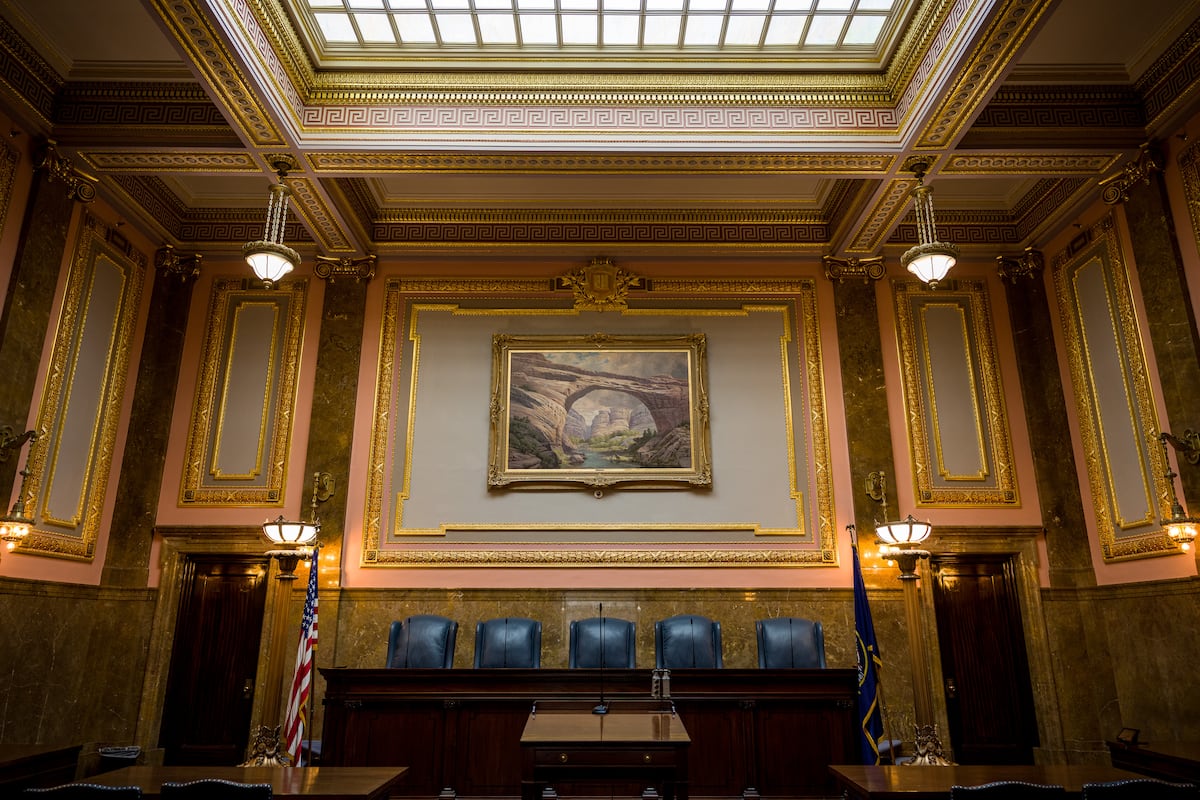The victory over the Bearcats is also important to Utah’s hopes of extending its NCAA tournament streak to five seasons, as there are several Big 12 teams — the Utes included — who are considered on …

Having lost its past two games and three of its previous four, the Utah women’s basketball team needed a spark to push its NCAA tournament hopes back in the right direction when Cincinnati came to the Huntsman Center on Saturday evening.
The Utes found that spark by doing what they do best — sharing the ball.
Utah had 22 assists on 24 made buckets, and the Utes beat the Bearcats 67-59 in front of a crowd that included plenty of former Utah players on hand for Elaine Elliott’s banner celebration.
Utah’s winningest head coach was honored at halftime, and thankfully for the crowd, the Utes (17-9, 8-6 Big 12) put on a show good enough for a win.
“It’s been a minute since we’ve won at home. I’m really excited about that. We had 22 assists on 24 made baskets. That’s Utah basketball,” Utah coach Gavin Petersen said.
“I’m really proud of our kids for moving the ball and sharing the ball.”
That effort was led by senior Lani White, who dropped in a game-high 23 points and hit six 3-pointers.
She also had six rebounds and two assists to counter four turnovers while shooting 8 of 14 from the field.
“I was confident in my shot, but I was trying to play within our offense, kick out 3s, just playing inside out,” White said.
“The rim looked a lot bigger after the first shot went in. I was trying to stay within our system and hit the normal shots that we always shoot.”
White’s fellow senior Maty Wilke also came up big, adding 12 points, four rebounds, four assists and three steals.
While it wasn’t the best shooting night for the Utes, who shot 41.4% from the floor and were 8 of 29 from 3-point range, they were 11 of 14 from the free-throw line.
Cincinnati, meanwhile, struggled scoring until the fourth quarter as it tried to rally. The Bearcats (9-17, 4-10 Big 12) shot 38.7% overall, 2 of 11 from 3-point range and 9 of 17 from the free-throw line.
“The tougher team wins and the past two games, we weren’t the tougher team. Coming in today, that was our mindset,” Wilke said.
“That also goes with playing hard, not just going through the motions, and no matter the result, as long as you give it your all, you can live with it.”
After a slow start offensively for both teams, Utah got things going in the second quarter and kept it rolling in the third.
The Bearcats led 12-11 after one quarter, but the Utes outscored them 19-10 in the second frame to build an eight-point halftime lead.
Utah extended that lead as high as 18 points in the third quarter before weathering a rally from Cincinnati in the final period.
The Bearcats cut it to a five-point game at 55-50 with just over four minutes to play, but Utah followed the lead of White, Wilke and Reese Ross (eight points, six rebounds, two assists) in finding enough points to keep Cincinnati at bay.
White, in particular, hit a pair of big shots. First, she scored on a fastbreak layup to push the lead back out to seven (Utah ended the night with a 17-5 edge in fast break points).
Then, with 1:32 remaining, White took a pass from LA Sneed and knocked down her final 3-pointer of the night, from straightaway, to make it a double-digit lead at 62-51.
Cincinnati had three players in double-figures, led by Caliyah DeVillasee, who ended up with 13 points and five assists.
The way the Bearcats clawed their way back into the game in the fourth quarter was on Utah’s minds following the contest. Far too often this year, the Utes have allowed opponents to rally against them after building big leads, and Cincinnati was no exception.
“We get comfortable, but then we get casual. Unfortunately, I don’t know what it is,” White said. “… We need to work on what’s working in the first half is that we need to carry that into the second, and unfortunately, we go outside of our system and go outside of ourselves, and then we start pressing the issue.
“It’s not because we have a young group. It’s just because we get comfortable and casual with that scoreboard, and that’s not Utah basketball.”
Petersen said it’s a mindset the team needs to adjust.
“Our mindset has had shifts from playing to win to playing not to lose,” he said. “We’ve got to figure out that we play to win.
“I don’t care what the score is. I don’t care how much time is left. We are playing to win.”
With only four games left in the regular season, Utah is in a tie for seventh in the Big 12 standings with Arizona State, which swept the Utes this year.
The top eight seeds in the upcoming Big 12 tournament, which runs March 4-8 at T-Mobile Center in Kansas City, earn a first-round bye.
The victory over the Bearcats is also important to Utah’s hopes of extending its NCAA tournament streak to five seasons, as there are several Big 12 teams — the Utes included — who are considered on the bubble as the regular season winds down.
Utah will have a quick turnaround after Saturday’s game, as it will play on Monday in a noon MST matchup at Oklahoma State.
“Credit to Cincinnati, they started to be the aggressor and in this game sometimes you get rewarded. They made a run, but we were able to withstand that and close it out down the stretch,” Petersen said.
“I’m really happy that we’re able to get this one done and now we can turn our attention to Oklahoma State and travel tomorrow, play Monday.”
Source: Utah News








